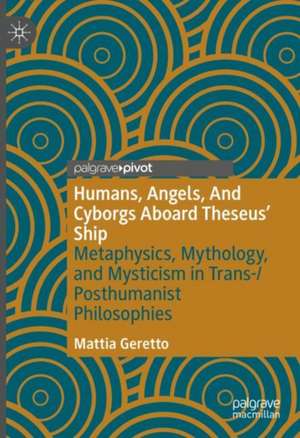Humans, Angels, And Cyborgs Aboard Theseus' Ship: Metaphysics, Mythology, and Mysticism in Trans-/Posthumanist Philosophies
Autor Mattia Gerettoen Limba Engleză Hardback – 4 mai 2024
The goal is to ‘enhance’ contemporary transhumanism and posthumanism by promoting the need to safeguard intelligence as a principle, without falling into the trap of a violent and egotistic metaphysics.
Preț: 313.51 lei
Nou
Puncte Express: 470
Preț estimativ în valută:
60.03€ • 62.51$ • 49.80£
60.03€ • 62.51$ • 49.80£
Carte disponibilă
Livrare economică 24 ianuarie-07 februarie
Preluare comenzi: 021 569.72.76
Specificații
ISBN-13: 9783031547188
ISBN-10: 3031547187
Ilustrații: XV, 148 p.
Dimensiuni: 148 x 210 mm
Greutate: 0.35 kg
Ediția:2024
Editura: Springer International Publishing
Colecția Palgrave Macmillan
Locul publicării:Cham, Switzerland
ISBN-10: 3031547187
Ilustrații: XV, 148 p.
Dimensiuni: 148 x 210 mm
Greutate: 0.35 kg
Ediția:2024
Editura: Springer International Publishing
Colecția Palgrave Macmillan
Locul publicării:Cham, Switzerland
Cuprins
Chapter 1. Preliminary Metaphysical Discourse.- Chapter 2. The Theseus’ Ship Paradox: Possibilities and Limits of a Trans-/Posthumanist Interpretation.- Chapter 3. Theseus and the Minotaur, Ariadne and the Labyrinth. Addressing Contemporary Monsters, Death, and Trans-/Posthumanist ‘Mysticism’.
Notă biografică
Mattia Geretto received a PhD in Philosophy of Religion at the University of Perugia, Italy. Among his publications, L’angelologia leibniziana (2010) and many other articles on Leibniz. Since 2011 he is affiliated to Ca' Foscari University of Venice.
Textul de pe ultima copertă
“Any book of contemporary metaphysics that draws so heavily on Bruno and Leibniz is clearly on the right track! Mattia Geretto does that and more in his book, which extends new materialism down unexpected paths. This is a learned and imaginative work.”
—Graham Harman, Southern California Institute of Architecture, USA
“In this compact but rich and erudite book, Geretto accomplishes the nearly impossible, reconciling contemporary trans-/post-humanist theories with key texts and concepts—modern and classical, secular and spiritual—threatened with obsolescence in the ongoing deconstruction of the Humanist tradition. In elaborating the possibility of a different metaphysical basis for posthuman thought, Geretto balances the turn to a radical materialism with a pre-modern mystical tradition that locates the immateriality of intelligence in the materiality of being-beyond-the-human.”
— Russell Kilbourn, Wilfrid Laurier University, Canada
This book addresses the most suggestive themes of transhumanism and critical posthumanism by placing them in dialogue with classic problems of metaphysics, and with some great thinkers of the past (Bruno, Spinoza, and above all Leibniz). The main purpose of this comparison is to invite transhumanists and critical posthumanists to consider a highly complex problematic tradition rooted in the history of philosophy. This study also makes use of examples drawn from the history of mythology, angelology, and mysticism. At the same time, the book promotes dialogue between scholars of classical metaphysics and philosophy of religion, and the potential metaphysical/spiritual theories developed independently by transhumanist and posthumanist thinkers within an anti-dualist and naturalistic philosophical framework.
The goal is to ‘enhance’ contemporary transhumanism and posthumanism by promoting the need to safeguard intelligence as a principle, without falling into the trap of a violent and egotistic metaphysics.
Mattia Geretto received a PhD in Philosophy of Religion at the University of Perugia, Italy. Among his publications, L’angelologia leibniziana (2010) and many other articles on Leibniz. Since 2011 he is affiliated to Ca' Foscari University of Venice.
—Graham Harman, Southern California Institute of Architecture, USA
“In this compact but rich and erudite book, Geretto accomplishes the nearly impossible, reconciling contemporary trans-/post-humanist theories with key texts and concepts—modern and classical, secular and spiritual—threatened with obsolescence in the ongoing deconstruction of the Humanist tradition. In elaborating the possibility of a different metaphysical basis for posthuman thought, Geretto balances the turn to a radical materialism with a pre-modern mystical tradition that locates the immateriality of intelligence in the materiality of being-beyond-the-human.”
— Russell Kilbourn, Wilfrid Laurier University, Canada
This book addresses the most suggestive themes of transhumanism and critical posthumanism by placing them in dialogue with classic problems of metaphysics, and with some great thinkers of the past (Bruno, Spinoza, and above all Leibniz). The main purpose of this comparison is to invite transhumanists and critical posthumanists to consider a highly complex problematic tradition rooted in the history of philosophy. This study also makes use of examples drawn from the history of mythology, angelology, and mysticism. At the same time, the book promotes dialogue between scholars of classical metaphysics and philosophy of religion, and the potential metaphysical/spiritual theories developed independently by transhumanist and posthumanist thinkers within an anti-dualist and naturalistic philosophical framework.
The goal is to ‘enhance’ contemporary transhumanism and posthumanism by promoting the need to safeguard intelligence as a principle, without falling into the trap of a violent and egotistic metaphysics.
Mattia Geretto received a PhD in Philosophy of Religion at the University of Perugia, Italy. Among his publications, L’angelologia leibniziana (2010) and many other articles on Leibniz. Since 2011 he is affiliated to Ca' Foscari University of Venice.
Caracteristici
Explores the spiritual potentials of critical and philosophical posthumanism Highlights the new 'mythical' ideas present within posthumanist thought Challenges the dominant Spinozian neo-materialism, and promotes an ontology of the 'posthuman person'
